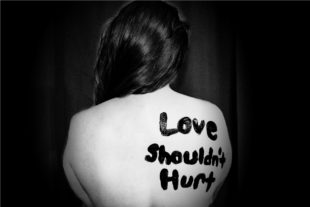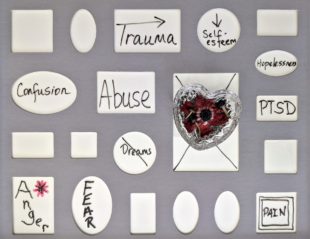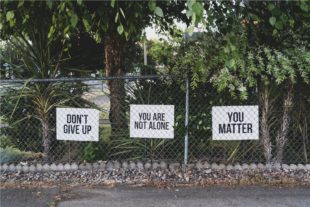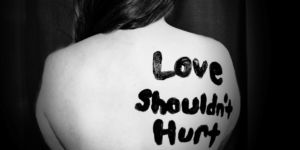Am I in an Emotionally Abusive Relationship?
Christian Counselor Spokane
Have you ever felt extremely confused in a relationship? Where do you stand with this person? Why do you feel a lot of negative emotions about them, but also feel very attached to them? When there’s conflict, why do you feel like your mind is swirling with guilt, fear, and intense stress?
 After a conflict, why do you spend so much time going over and over what happened in your mind, trying to cling to your sense of reality? Why do you question your sanity and your interpretation of events? Why do you feel like you can’t trust yourself?
After a conflict, why do you spend so much time going over and over what happened in your mind, trying to cling to your sense of reality? Why do you question your sanity and your interpretation of events? Why do you feel like you can’t trust yourself?
You may have these questions, but they may not be about a spouse or partner – they could be about a parent. But when you’re an adult, it’s much more likely that you’re asking yourself these questions about your marriage or dating relationship. And if you’re asking these questions, recognize that they are red flags for emotional abuse.
The word abuse can be volatile. Often, we equate it with violence. If someone isn’t shoving or hitting you, they’re not abusive, right? The truth is that non-physical abuse, also known as psychological or emotional abuse, can be just as damaging as physical abuse.
It’s damaging physically, even if the person never lays a hand on you, which is why it’s critical to identify emotional abuse if you’re experiencing it in your relationship. If you’re in an emotionally abusive relationship, you are in an unsafe situation.
What is Emotional Abuse?
We must be precise when we define emotional abuse. Why? Because by its very nature, it confuses and distorts reality for its target.
Verywell Mind defines emotional abuse this way: “Emotional abuse is a way to control another person by using emotions to criticize, embarrass, shame, blame, or otherwise manipulate another person. In general, a relationship is emotionally abusive when there is a consistent pattern of abusive words and bullying behaviors that wear down a person’s self-esteem and undermine their mental health.”
So, according to this definition, emotional abuse is a pattern of control employing words and bullying behaviors. The outcome is worn-down self-esteem and undermined mental health.
What Makes Emotional Abuse So Confusing?
The National Network to End Domestic Violence (NNEDV) says: “Commonly, emotional abuse makes the victim feel like they are responsible for the abuse and to feel crazy, worthless, and hopeless. It is so damaging that many survivors of domestic violence report that they would have rather [sic] ‘be hit’ than endure the ongoing psychic damage of emotional abuse.”
Some of the components of an emotionally abusive relationship include:
 Gaslighting, or making the abuse target believe that they are crazy or confused. This is accomplished by the abuser pretending to forget things that have happened, denying reality, or using other, similar methods to confuse the abuse target.
Gaslighting, or making the abuse target believe that they are crazy or confused. This is accomplished by the abuser pretending to forget things that have happened, denying reality, or using other, similar methods to confuse the abuse target.
Mind games. Emotional abuse often employs psychological attacks combining truths, half-truths, and lies to confuse the victim. The abuser can take the victim’s good intentions, desire to fix things and work on the relationship, and desire to accept constructive criticism, and twist them into a confusing mess that is impossible to untangle.
A 50-50 perspective on relationships. While it is true that in a fundamentally healthy marriage, both people should accept responsibility for their part in a conflict, no one is responsible for abuse except an abuser. There is no such thing as a “perfect victim,” but that doesn’t excuse the abuse. Abuse is not a marriage problem, it’s a character problem on the part of the abuser.
The cycle of abuse. All abuse tends to happen in a cycle with four distinct stages: tension-building, abusive incident, reconciliation, and calm (Healthline). The period of calm, also known as the honeymoon period, can be very pleasant and it’s extremely common for the abuse victim to believe that the abuser has changed, and things will return to the way they used to be before the abuse started. This hope is what keeps many victims trapped in abusive relationships for so long.
What Makes Emotional Abuse Harmful?
It’s not “just” emotional abuse. It’s not okay because he didn’t hit you. It’s not okay because he’s not physically violent. Emotional abuse puts your body in fight-or-flight mode. Stress hormones elevate. Cortisol and adrenaline rise. Remaining in this state for prolonged periods puts you at risk of developing post-traumatic stress disorder (PTSD). According to DomesticShelters.org, seven out of ten women who experience psychological abuse develop PTSD.
(Women can also perpetrate emotional abuse, but most offenders are men, so this article will refer to the abuser as “he” and the victim as “she.” However, it’s important to know that women can abuse as well.)
In a nutshell? Emotional abuse causes mental, psychological, and even physical damage. If you are in an emotionally abusive situation, you are not safe.
Signs of an Emotionally Abusive Relationship
We’ve already covered some of the indicators of emotional abuse you should consider, but here are more, from Verywell Mind and NNEDV:
Unreasonable expectations. The abuser might make irrational or unreasonable demands of your time, energy, and emotions.
Invalidation. Your emotions are not accepted and responded to respectfully. You are treated like what you feel and believe is wrong and should be dismissed, mocked, or ridiculed.
 Chaos. There is often a lack of predictability to an abuser’s behavior, even within the stages of the abuse cycle, and especially in the tension-building phase. They can be very unpredictable and make you feel constantly on edge and like you’re “walking on eggshells.”
Chaos. There is often a lack of predictability to an abuser’s behavior, even within the stages of the abuse cycle, and especially in the tension-building phase. They can be very unpredictable and make you feel constantly on edge and like you’re “walking on eggshells.”
Emotional blackmail. Your emotions, thoughts, and beliefs will be used against you. The abuser might use guilt, withholding affection, or other manipulative measures to control you.
Acting superior. The abuser will speak to you in a condescending, scoffing, or sarcastic way, putting you down and making you feel stupid or inferior.
Controlling and isolating. Your actions and whereabouts might be monitored and/or limited. You might be accused of cheating for no reason. You might be coerced into spending all your time with the abuser and isolating yourself from family and friends.
Emotional abuse tends to overlap with other forms of abuse, including:
- Physical. Pushing, hitting, slapping, choking, throwing things, threats of using force, intimidation, etc.
- Verbal. Name-calling, insults, constant criticism, put-downs.
- Sexual. Assault, coercion, manipulation, harassment.
- Financial. Tightly controlling the accounts, refusing to let you have access to money, refusing to let you work, etc.
What Should I Do if I’m Being Emotionally Abused?
If you’ve started to think you might be in an emotionally abusive marriage or relationship, here are some steps you can take.
1. Assess for safety.
If you think you might be in physical danger, contact the Domestic Violence Hotline at 1.800.799.SAFE or go to thehotline.org to speak to a trained counselor who can help you assess your risk level and make a safety plan.
DomesticShelters.org lists these behaviors as red flags that emotional abuse may escalate to physical abuse:
- Isolation
- Threats with a weapon
- Blame-shifting
- Property destruction
- Any threat
- Constant surveillance
- Excessive jealousy
- Sexual pressure or pressure to use substances
- History of abusing others
- Seems out of control around abuse target but calm around others
Not all emotional abusers are physically dangerous, but it’s important to consider both the red flags as well as your instincts in the situation.
 2. Reach out for help.
2. Reach out for help.
Start by telling one person (make sure it’s a safe person who will be supportive). Contact one of our counselors at Spokane Christian Counseling to schedule a confidential, risk-free initial session.
3. Understand the cycle of abuse.
In counseling and using online resources like thehotline.org and domesticshelters.org, you can learn about the cycle of emotional abuse, including the honeymoon period, the tension-building phase, the abusive incident, and the reconciliation phase.
4. Start building your support system.
Since abusers tend to isolate their victims, it’s possible you find yourself in a lonely situation, cut off from friends and family, at least somewhat. Start taking small steps to build friendships and support back into your life, even if it’s just an online support group. You’ll need every bit of support you can find.
5. Keep a record of abusive incidents.
Keep a private journal or series of notes about the things your spouse/partner says and does that are emotionally abusive. Even if you never show this record to anyone else, it can help you identify patterns and the cycle of abuse. It might also be helpful if you ever need to go to court for any reason, so make sure you keep it confidential, and dated/time stamped.
6. Start taking care of yourself.
Depending on your situation, find ways that you can take care of yourself, even if it’s something small like journaling your thoughts, listening to music, or
taking a walk.
7. Work on an exit plan.
As Christians, we are often unsure what to do in cases of abuse in marriages, especially non-physical abuse. You don’t have to make any permanent decisions that you don’t have peace about, but remember that your safety matters to God, too. Your Christian counselor can help walk with you through all your doubts and fears.
If you’re experiencing emotional abuse, you don’t have to deal with it on your own. There is support available to you. Contact our office at (509) 209-8961 or through our contact form https://spokanechristiancounseling.com to reach out for help today.
Resources:
https://www.verywellmind.com/identify-and-cope-with-emotional-abuse-4156673
https://www.domesticshelters.org/articles/identifying-abuse/when-abuse-goes-from-shouting-to-shoving
https://www.healthline.com/health/relationships/cycle-of-abuse
“Love Shouldn’t Hurt”, Courtesy of Sydney Sims, Unsplash.com, CC0 License; “Trauma”, Courtesy of Susan Wilkinson, Unsplash.com, CC0 License; “Don’t Give Up”, Courtesy of Dan Meyers, Unsplash.com, CC0 License; “Fairy Bonsai”, Courtesy of Faye Cornish, Unsplash.com, CC0 License





